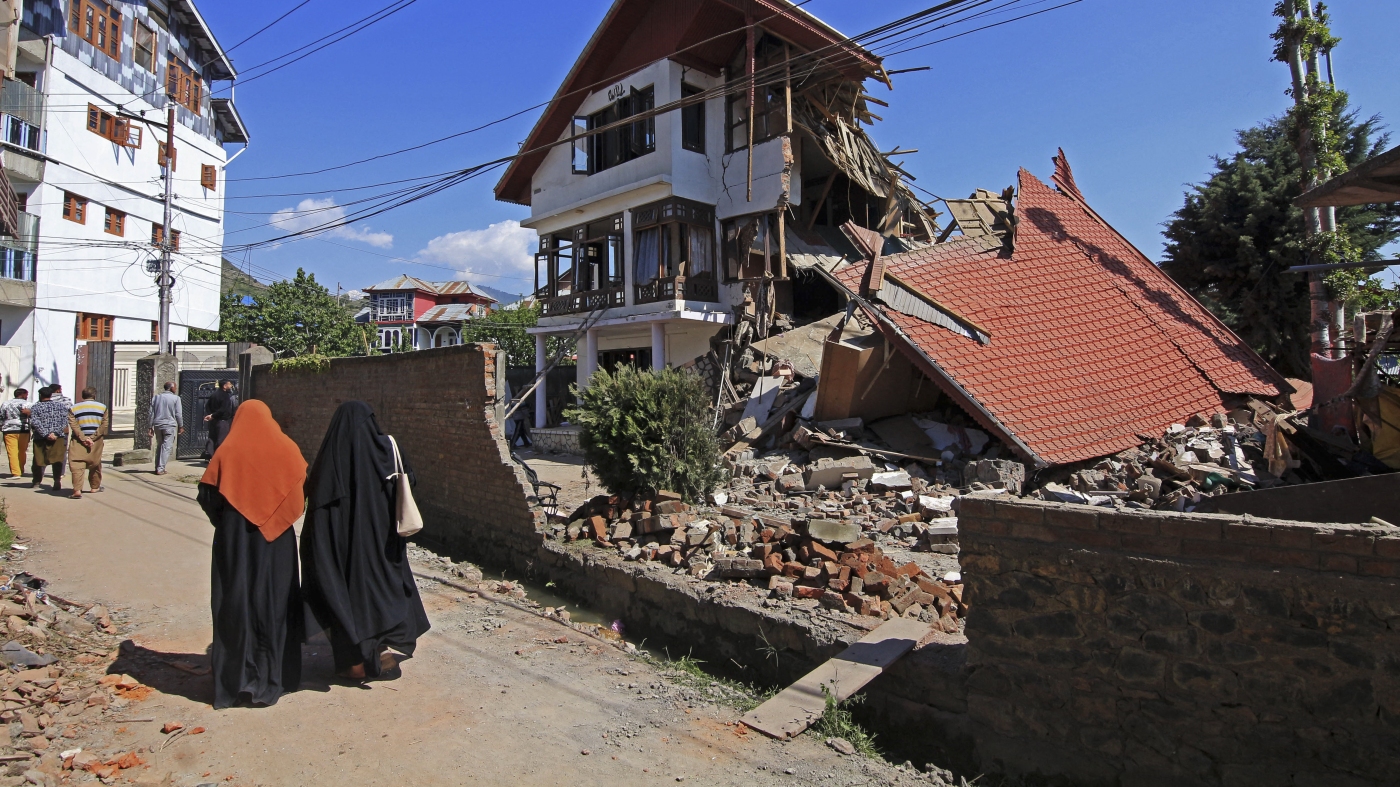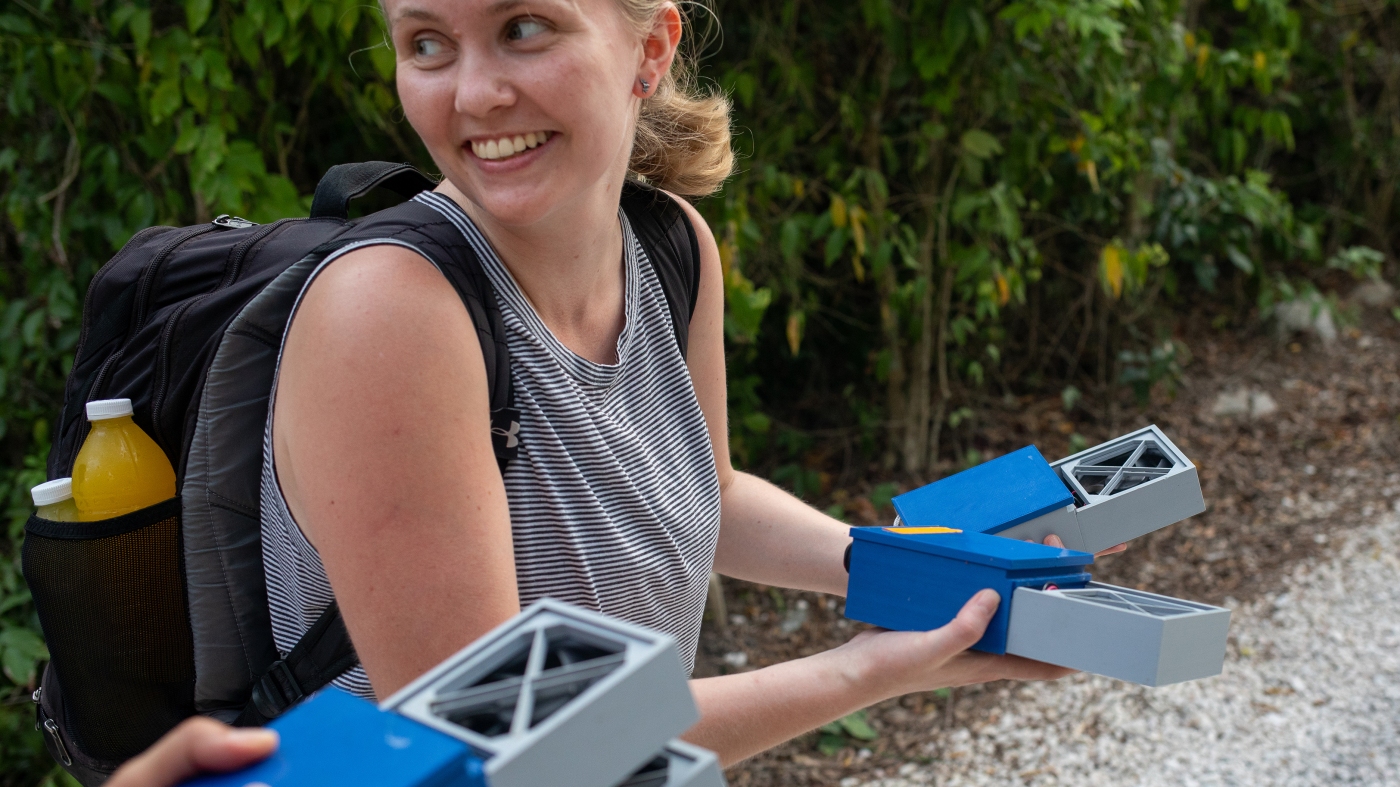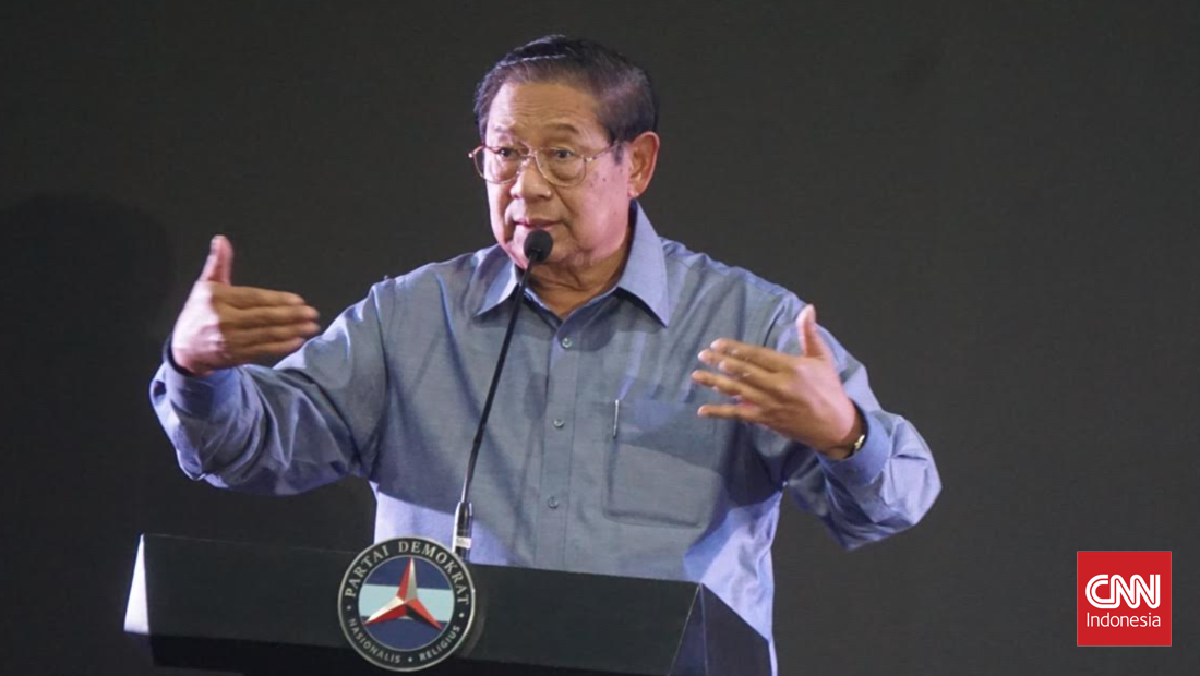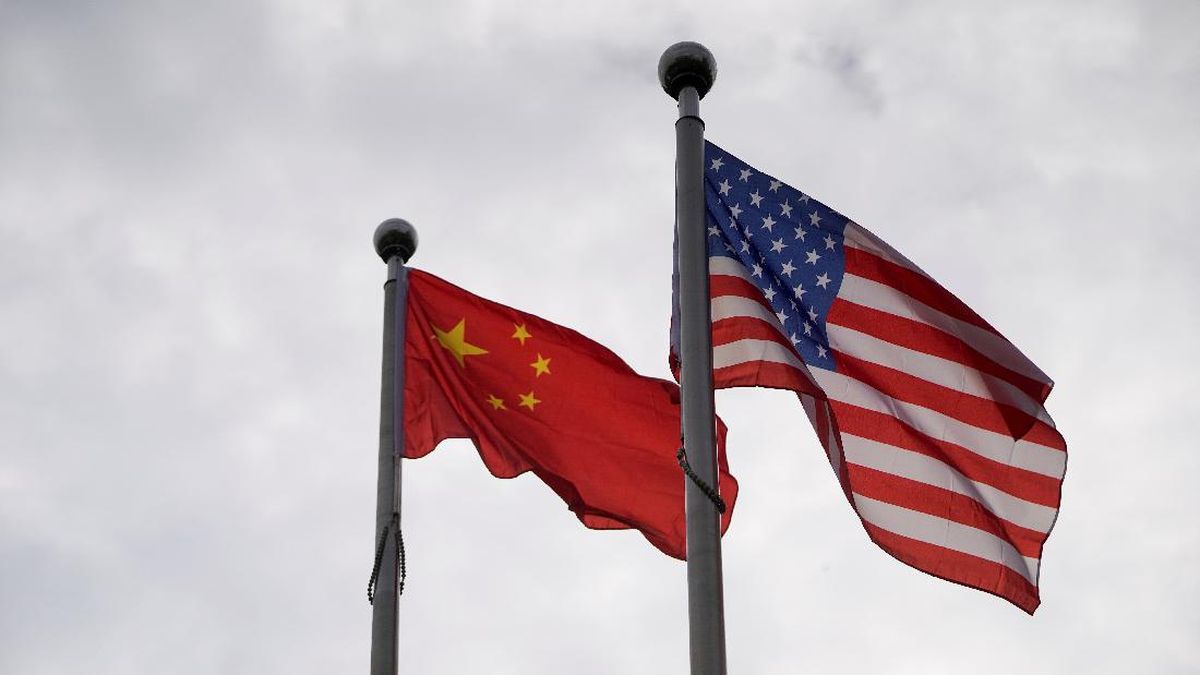
Megan Mainzer, the McKinney-Vento liaison for Middletown Public Schools in Rhode Island, speaks with a young girl at the Island Oasis, a food and clothing pantry that's managed, in part, with federal grant money. Josephine Sittenfeld for NPR hide caption
toggle caption
Josephine Sittenfeld for NPR
Ninth grader Dayana estimates she's moved about six times in the last six years.
She said her family hasn't had a fixed place to live since they moved to southern Rhode Island from Guatemala in 2019. This part of the state can be expensive, and they can't afford the cost of a home of their own, so the family of four currently rents a single room in a house in Newport.
According to federal education law, Dayana and her family are experiencing homelessness. Dayana's family asked that we not use her full name because of the stigma associated with homelessness.
Amid all the moves, one thing has been constant for Dayana: her school.
That's because a federal law, known as the McKinney-Vento Homeless Assistance Act, allows students like her to stay in their school even when their housing takes them far from where they originally enrolled.
Dayana said that stability has helped her learn English. "Because my English improved here. The teachers helped me a lot here."
Roughly 1.4 million U.S. pre-K-12 students experienced homelessness in the 2022-'23 school year, according to the latest federal data. Education law defines homelessness as lacking a "fixed, regular, and adequate nighttime residence" — which includes families living doubled up with others.
McKinney-Vento provides extra help, through legal protections and a federal grant program, to make sure these students get an education.
But as the Trump administration works to close the U.S. Education Department, which oversees McKinney-Vento, advocates fear the law's protections could be eliminated, too.
"And if they don't exist anymore, then that means we revert back to 30 years ago where children languished in shelters, they languished on couches and cars, because they weren't actually in school," said Barbara Duffield, executive director of SchoolHouse Connection, a national nonprofit that advocates for homeless youth.

Families leave the Island Oasis with bags of food, clothing and more. The pantry, located inside Middletown High School, has a freezer full of frozen meat and seafood, a fridge with milk and eggs, pantry staples like rice and beans, and plenty of snacks. Josephine Sittenfeld for NPR hide caption
toggle caption
Josephine Sittenfeld for NPR
The Trump administration hasn't said what it plans to do with McKinney-Vento if it succeeds in closing the Education Department, and the department did not respond to questions from NPR about its plans for the law and federal grant program.
This week, a group of House Democrats and a couple Republicans issued a letter urging their colleagues to support the law and increase federal investment in it.
Trump's "skinny" budget proposal released earlier this month would consolidate 18 federal education programs into a block grant, but it does not name those programs. And the White House did not respond to NPR's request for clarity around whether McKinney-Vento was one of them.
If it is, Duffield said, "It effectively would repeal the program in its entirety, removing protections and dedicated funding [for students experiencing homelessness]."
An Island Oasis for families experiencing homelessness
Last year, Congress set aside $129 million for McKinney-Vento grants to help schools cover the costs of supporting students experiencing homelessness.
Dayana's school district, Middletown Public Schools, received $65,000 in McKinney-Vento funds.
Megan Mainzer is the district's McKinney-Vento liaison, tasked with identifying students experiencing homelessness and making sure they receive the resources they're entitled to under the law.

Visitors to the Island Oasis sort through the pantry's fresh produce offerings. One parent, John, said the pantry and the grocery store cards he's received from Mainzer have "made a huge difference" for him and his son. Josephine Sittenfeld for NPR hide caption
toggle caption
Josephine Sittenfeld for NPR
She said the district's McKinney-Vento money helps pay for transportation, scholarships for after-school care, hotspots, gas and groceries for families.
It has also helped Mainzer launch and staff a food pantry – in partnership with the local Dr. Martin Luther King Jr. Community Center – at Middletown High School, where Dayana attends.
It's called the Island Oasis.
The bright blue room next to the high school cafeteria has a freezer full of frozen meat and seafood, a fridge with milk and eggs, pantry staples like rice and beans, and plenty of snacks.
"I felt like I can't control the housing issues, but I can control being able to help families offset their costs by helping them cover their food bills so that they can put more money towards housing," Mainzer said.

A sign at the Island Oasis lists a freezer's contents, including chicken and fish, in Spanish. Josephine Sittenfeld for NPR hide caption
toggle caption
Josephine Sittenfeld for NPR
It's a resource John and his 11-year-old son rely on. John asked NPR not to use his full name because of the stigma associated with homelessness.
He said he and his son have been living in motels in both Middletown and Newport since the pipes burst in their home, making it uninhabitable. He hasn't found an affordable place for them to rent, and the pantry and the grocery store cards he's received from Mainzer have "made a huge difference," he said.
"Because hotels are not cheap, so a lot of money goes there," John said. "And I have a pride thing, so I feel like I won't reach out, but [Mainzer] reach[es] out to me."
"All of it keeps me up at night," one administrator says
Mainzer is deeply concerned that the law and the federal funding that supports students like Dayana and families like John's are at risk. Losing McKinney-Vento "would affect our ability to help families," she said.
She's not the only one who's worried. McKinney-Vento liaisons and advocates across the country are also anxious that if the Education Department is eliminated, the law itself could be rescinded. Even if the law remains, they're worried federal funding for it could be cut.

Families sort through donated clothing, jewelry and shoes at the Island Oasis. Josephine Sittenfeld for NPR hide caption
toggle caption
Josephine Sittenfeld for NPR
"It's terrifying," said Susie Terry, the coordinator for homeless education services for the San Diego County Office of Education. School districts in her county have identified more than 23,000 students experiencing homelessness.
"All of it keeps me up at night. I think that the dismantling of the [Education] Department and or the dismantling of the program — the funding for the program — is probably my biggest concern right now," she said.
Terry said districts that receive federal grant money use it to pay for things like transportation and to offset the salaries of McKinney-Vento liaisons.
"And it's not enough [money] by a long shot," she said, but the money schools do receive is crucial.
Jennifer Cress-Slife, the McKinney-Vento liaison for the Cedar Rapids Community School District in Iowa, said the law has made a big difference for her students.
"The students that we see receiving homeless designations are already our most vulnerable," she said. Her district has identified about 430 students experiencing homelessness this school year.
She said the rights they're entitled to mean they have easier access to an education.
"And losing any of that will make a huge difference," Cress-Slife explains. She worries not all school districts would continue to provide these protections in the absence of a federal mandate.
Without the law and the federal funding for it, "there would be higher rates of students failing," said Sabra Emde, the McKinney-Vento liaison for Ardmore City Schools in southern Oklahoma. Her district has identified 166 students experiencing homelessness this year.
"There would be higher rates of students who just flat out weren't attending school," Emde said.
A few scenarios for what comes next
Maura McInerney, legal director at the Education Law Center, a nonprofit advocacy organization in Pennsylvania, explains what's at stake if the Education Department disappears:
"Dismantling the Department of Education means that we don't have people at the federal level ensuring that children experiencing homelessness are receiving the guarantees of [McKinney-Vento]."
If the department remains, but the funding for McKinney-Vento is lumped into a block grant, she said school districts would be able to spend that money on things that have nothing to do with serving homeless students.
"It wouldn't come with the requirements that they comply with the law — that they're following McKinney-Vento, and that it's used for children experiencing homelessness," McInerney explained.
Aaron Tang, a law professor at the University of California Davis, said he's more concerned the Trump administration will decide to unilaterally withhold McKinney-Vento grant funding from states — which could have dire consequences for students.
"Every time you raise a barrier to funding a program, it increases the odds that the program's recipients – the folks who are supposed to be served, the kids in this case – won't get the services they need."
Meanwhile, ninth grader Dayana and her family recently found permanent housing.
She said she's grateful for the support she received over the last five years from Megan Mainzer, her McKinney-Vento liaison. Mainzer helped her enroll in middle school, connected her with peers who have since become close friends, provided clothing and delivered groceries to her home, and coordinated transportation to and from school.
Dayana said the impact of these resources have been life-changing for students like her.
"We can learn more, and we can have a future where we can find a good job and won't be too stressed like our parents are right now," she said.

 5 hours ago
2
5 hours ago
2



















































